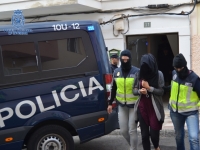Politics
The Spanish Police arrested two suspected jihadists prepared to attack
In France and Spain
USPA NEWS -
The Spanish Police arrested on Tuesday in Barcelona and on the island of Fuerteventura two people, a man and a woman, accused of belonging to DAESH, with whose leaders in Syria were allegedly in contact. Those arrested were preparing attacks in France and Spain.
Those arrested were a 32-year resident of Mataro, in the province of Barcelona, and a 19-year resident in the municipality of Pajara, on the Canary island of Fuerteventura. Both are Moroccan but legally reside in Spain. The arrests were carried out early on Tuesday and, as a result of them were registered housing in Mataro and a booth. The police operation remains open and further arrests are not ruled out.
According to Spanish Minister of Interior, Jorge Fernandez Diaz, the detainees had sworn allegiance to DAESH and had poured death threats against France and Spain. The minister explained that they were prepared to act immediately. Both were in "direct contact" with operating DAESH leaders in Syria and were also involved in the recruitment and indoctrination of Jihadists through Internet. They used social networks to disseminate "great deal of multimedia material," said the minister, who explained that through the Network disseminated information on the use of weapons and explosives, and videos about executions carried out by terrorists. Fernandez Diaz said the network had woven was "highly professional".
This year, Spanish Police have arrested a hundred suspected jihadists. Moreover, the finance ministers of the European Union agreed on Tuesday to propose to the Commission to adopt measures to cut off sources of funding of jihadism. They propose amongst other set limits on the movement of virtual currencies in European territory and limit no use of cash cards no linked to bank accounts where the holder is identified.
Liability for this article lies with the author, who also holds the copyright. Editorial content from USPA may be quoted on other websites as long as the quote comprises no more than 5% of the entire text, is marked as such and the source is named (via hyperlink).






